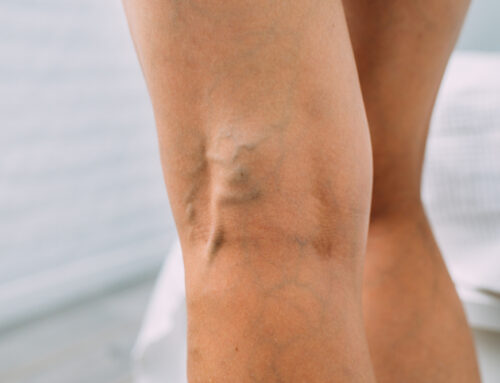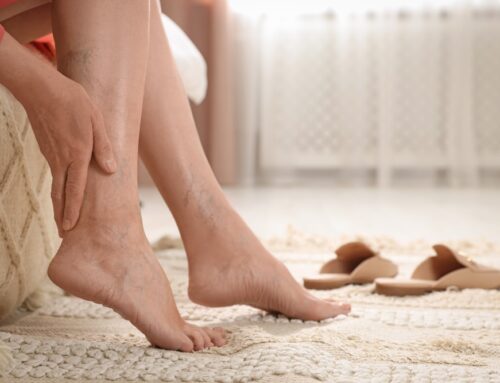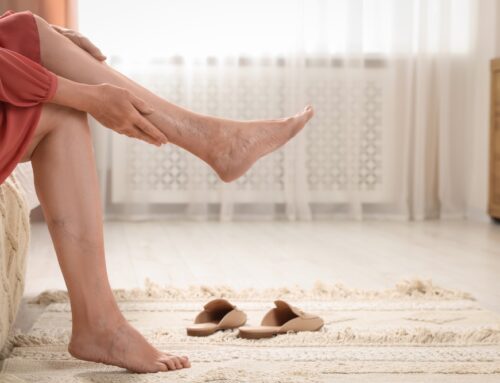Varicose Veins
First off, let’s talk about what varicose veins are. Generally speaking, varicose veins are veins that have become enlarged and twisted due to pooling blood.
When the valves in a vein malfunction, blood flowing through that vein no longer has something pushing it along. As a result, it stagnates and pools in pockets throughout the vein. As the blood strains against the vein walls, it causes the vein to enlarge and “pop out.” It also creates a bluish-purple effect that is visible to the naked eye.
Fortunately, varicose veins are mostly a cosmetic nuisance and have little harmful effect on your physical health.
Varicose Veins Symptoms
As mentioned above, varicose veins are largely an aesthetic concern. Many patients experience large bluish-purple veins up and down their legs (or other parts of the body depending on what areas are affected).
Appearances aside, however, some patients do experience mild physical symptoms. A mild feeling of heaviness or achiness in the legs, for example, is a common symptom. Itching and other light discomfort are also common.
Varicose veins do not typically manifest themselves as acute pain, however.You should always let your doctor know of any sharp pain or other unusual symptoms. These can be symptoms of a different health condition.
Varicose Veins Treatment
Why might one want to treat their varicose veins? Well…there are plenty of great reasons. A lot of the time, varicose veins are simply a nuisance. Their appearance might discourage you from wearing shorts, and the achiness could keep you from performing physical activity.
In any of these cases, medical intervention can be a great course of action.
Fortunately, there are a variety of surgical and non-surgical procedures, as well as home remedies that can help ease symptoms.
Surgical vs. Non-Surgical Procedures
Now, let’s talk a bit about the difference between surgical and non-surgical procedures.
Generally speaking, surgery is a serious medical procedure that involves anesthesia and cutting into tissue.
Non-surgical procedures, on the other hand, are more superficial in nature and carry less risk. Since there is minimal cutting, there is also little to no downtime for recovery.
Since varicose veins are a fairly straightforward issue and lie close to the surface of your skin, non-surgical procedures can typically get the job done.
Non Surgical Vein Treatment
Let’s start with the non-surgical treatment options. Your vein specialist will most likely recommend one of these treatments for your varicose veins.
Sclerotherapy – This is a straightforward treatment that involves injecting a solution into the damaged vein. Once injected, the solution irritates the vein walls, causing them to stick together. After the vein sticks together, it begins disintegrating and being reabsorbed back into the body. Blood can then simply redirect to a healthier vein.
Microphlebectomy – This treatment is often used for veins that are too large to be treated with sclerotherapy. During this procedure, your doctor makes a small incision and pulls the damaged vein out section by section. Although this procedure may sound a little more daunting, it’s actually very common, and requires little to no recovery time.
Venous Ablation – Similarly to sclerotherapy, the purpose of this procedure is also to seal up the vein. The main difference between the two is that venous ablation actually uses radiofrequency energy to seal up the vein.
In addition to the above treatments, your doctor may also recommend at-home remedies to alleviate symptoms. Compression stockings and regular exercise can help with some of the physical symptoms, while concealer and sunless tanning lotions can help with the cosmetic symptoms. Keep in mind, however, that some kind of medical intervention is necessary in order to get rid of a varicose vein for good.
Varicose Vein Surgery
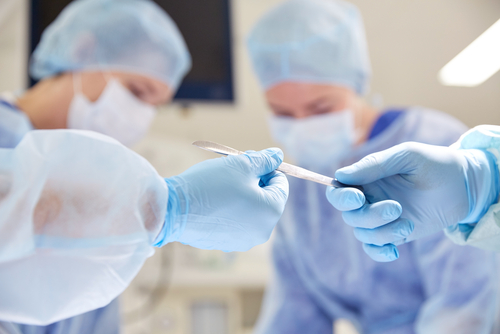
For a more drastic option, surgical procedures such as vein stripping do exist. This is a less common treatment option however, due to the fact that it carries higher risks of complications, and a longer recovery time.
Unlike with sclerotherapy, recovery from a vein stripping surgery can take up to a few weeks. Furthermore, you will not be able to drive for at least 3-5 days post-procedure.
That being said, your vein specialist may recommend a surgical option if your varicose veins are extremely large. Likewise, if non-invasive vein treatments don’t work (meaning the vein doesn’t respond to treatment), a more invasive procedure may be the only remaining option.
When Is Varicose Vein Surgery The Best Choice?
At the end of the day, the best way to know which treatment is right for you is to schedule a consultation with a vein specialist. A vein specialist will be able to analyze your symptoms and come up with a treatment plan for you.
Most patients will start off with a less invasive treatment option such as sclerotherapy. Having said that – if your vein does not respond to those treatments, your doctor may recommend a slightly more invasive option.
Either way, our team here at VeinSolutions™ will work with you to figure out the best treatment plan for your specific needs.
The best part about VeinSolutions™? Our consultations are FREE. This means that you can come in for a vein screening and ask questions without worrying about pricy medical fees. One of our vein specialists will do a thorough consultation and vein screening well before you have to go in for any treatments. Visit our office in either Flint or Lapeer.
If you do decide to move forward with a treatment our whole team is here to support you.
Commonly Asked Questions
Here are a few more commonly asked Q&A’s that we’ve compiled for your convenience.
When To Worry About Varicose Veins?
Generally speaking, varicose veins are a largely cosmetic concern. This means that you typically don’t have to worry about them at all.
You should still get your veins checked out by a doctor on the off chance that what you’re experiencing is actually not varicose veins. Additionally, you should also let your doctor know immediately if you experience any pain or discoloration in the area surrounding your veins. Although it’s very rare, varicose veins can occasionally develop a complication.
What Does Varicose Vein Pain Feel Like?
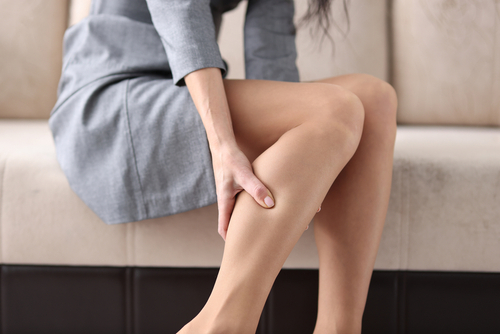
Varicose veins typically cause more discomfort than pain. This can often feel like a heaviness, achiness, or itchiness in the legs.
If however, you begin experiencing sharp pain or bleeding, you should consult with a doctor as soon as possible.
How Do You Get Varicose Veins?
Genetics is the primary culprit that causes varicose veins – although excess weight and lack of physical activity can contribute as well. That’s why it’s best to make sure you maintain healthy eating and exercise habits.
How Do Varicose Veins Form?
As we mentioned in the beginning, varicose veins occur when blood pools and begins straining against the walls of a vein. This is usually because a valve malfunctions and is no longer able to keep your blood circulating.
What Makes Varicose Veins Worse?
As far as symptoms go, heat is well-known to increase discomfort from varicose veins. That’s why hot tubs, saunas, and heating pads are not recommended to varicose vein patients. Instead, opt for cooler temperatures and ice packs, which can help decrease swelling in the veins.
VeinSolutions™ at Michigan Vascular Center
Regardless of what option you decide to go with, we’ve got you covered here at VeinSolutions™. Our team of highly qualified vein specialists are happy to offer their medical expertise as well as a shoulder to lean on.
Come in for your FREE vein screening today. VeinSolutions™ also offers venous ultrasounds when necessary to help reach a diagnosis. Read more about this procedure here.
As far as interventive procedures, we offer sclerotherapy, microphlebectomy, and venous ablation. Have questions about the procedures? Learn more about vein procedures and conditions through our vein health articles.
Our contact page also offers a convenient online form. Simply fill it out, hit send, and someone from our team will get back to you as soon as possible.
